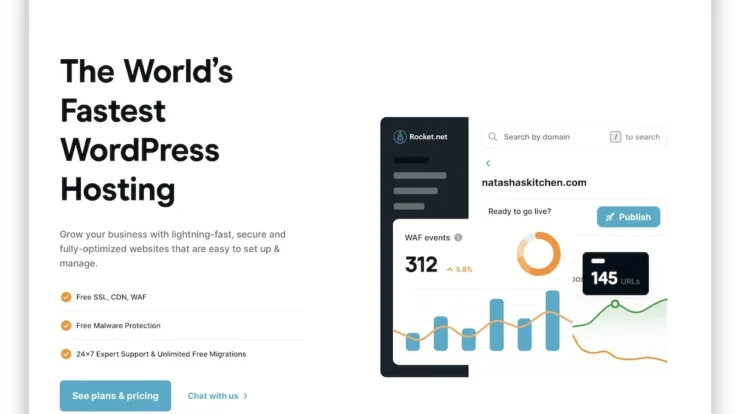
Choosing the right database hosting solution is crucial for any Laravel application, impacting its performance, scalability, and overall reliability.
Laravel, a popular PHP framework, relies heavily on a robust database system to function effectively. A poorly configured database can lead to sluggish application responses, frustrating users, and potentially compromising the integrity of your data.
This article delves into the essential considerations for selecting the best hosting for a Laravel database, guiding you through evaluating different options and their suitability for your project’s demands.
The speed and efficiency of your database interactions directly affect the user experience. A lightning-fast database response time ensures smooth page loads and a seamless application experience.
Understanding your application’s specific needs is paramount when choosing a hosting provider for your Laravel database. Factors such as expected traffic volume, data storage requirements, and anticipated growth projections must be carefully weighed.
Selecting the best hosting for Laravel databases extends beyond simply choosing a provider; it involves understanding the technical specifications, the offered features, and the reliability of the infrastructure.
From shared hosting to dedicated servers, a variety of options exist. Understanding each type’s strengths and weaknesses allows you to make informed choices that optimize your application’s performance.
This comprehensive guide explores the key elements of optimal Laravel database hosting, including security considerations, scalability options, and cost-effectiveness. This exploration will equip you to find the best hosting for your Laravel database needs.
Database Management Systems (DBMS) for Laravel Applications
Choosing the right Database Management System (DBMS) is a pivotal step in selecting the best hosting for a Laravel database, directly influencing a project’s success.
Laravel, a robust PHP framework, necessitates a powerful and reliable DBMS to handle the demands of data storage and retrieval.
The selection of a DBMS fundamentally impacts the performance of Laravel applications by affecting database interactions, query efficiency, and ultimately, the application’s overall responsiveness.
Different DBMS solutions, such as MySQL, PostgreSQL, or MongoDB, cater to diverse project requirements.
MySQL, a widely used open-source relational database, offers a robust and mature ecosystem, making it a suitable choice for many Laravel projects. Its extensive support and readily available tools often make setup and maintenance simpler.
PostgreSQL, another popular relational database system, is known for its advanced features, high performance, and scalability. Its ability to handle complex queries and large datasets makes it suitable for complex Laravel applications requiring robust database capabilities.
MongoDB, a document-oriented database, provides flexibility in storing and querying data. Its schema-less nature allows for rapid adaptation to evolving data structures, making it advantageous for applications with dynamic data models.
The optimal choice of DBMS depends critically on factors like anticipated data volume, complexity of queries, and expected application growth.
Understanding the specific demands of your Laravel application is essential in selecting the most appropriate DBMS. This understanding allows you to identify the DBMS’s capabilities most closely aligned with your project’s specific needs and future growth.
The performance characteristics of each DBMS vary, and these variances can significantly impact application performance, making it crucial to select a DBMS that aligns with the required speed and responsiveness of your Laravel application.
Careful consideration of the DBMS’s strengths, weaknesses, and scalability capabilities is key when selecting the ideal hosting solution to support your Laravel application’s database requirements.
This careful consideration ensures your Laravel application’s database experiences optimal performance, reliability, and scalability. Choosing the right DBMS is a fundamental step in building a robust and scalable Laravel application.
Database Scaling Considerations for Laravel Hosting
Scalability is a critical aspect of choosing the optimal hosting environment for a Laravel database. The ability to handle increasing data volumes and user traffic is essential for long-term project success.
Laravel applications often experience growth over time. This growth necessitates a hosting solution that can adapt to the demands of an expanding user base and database size.
A robust hosting platform must offer the flexibility to scale resources, including database storage, processing power, and network bandwidth, without sacrificing performance.
Choosing a cloud-based hosting solution, specifically designed for database scalability, often proves advantageous. This architecture allows for elastic scaling in response to fluctuations in workload, ensuring seamless performance regardless of the current demand.
Laravel developers need to consider the potential growth trajectory of their applications when evaluating hosting options. A hosting provider that supports both vertical and horizontal scaling is ideal for handling anticipated growth.
Vertical scaling involves increasing the resources of a single server, such as CPU or RAM, to handle more database requests. Horizontal scaling involves distributing the workload across multiple servers, improving performance as traffic volume expands.
The ability to dynamically adjust the database’s computational power and storage capacity according to fluctuating demands is crucial for smooth performance. A hosting provider proficient in these techniques will minimize performance bottlenecks and support consistent user experience.
A well-designed hosting environment for a Laravel database allows for the deployment of efficient scaling strategies, supporting sustained growth and providing a stable platform for continuous development and updates.
Understanding your anticipated database growth is vital when choosing a hosting solution. This planning allows you to select a platform that can adapt to these needs, promoting long-term stability and allowing for ongoing project growth.
Different hosting providers cater to varying needs. Assessing the specific capabilities of each vendor concerning scaling strategies, cost models, and support infrastructure is paramount.
The specific architecture for your Laravel application will dictate the approach to selecting a scalable hosting option. For example, an e-commerce application will require a different hosting plan from a basic blog application.
Predicting future database load is challenging but essential for a smooth transition to a scalable hosting solution. It’s often wise to choose a hosting plan with provisions for future growth to avoid performance issues.
Many Laravel applications can utilize cloud-based database services to efficiently handle database scaling. This approach often offers a pay-as-you-go model and highly scalable infrastructure, providing a suitable solution to growing demands.
Finally, a well-planned strategy for database scaling will significantly impact the success of your Laravel application. Understanding the dynamics of scaling from the outset is pivotal when selecting the best hosting for a Laravel database, guaranteeing a reliable platform for long-term project growth.
Database Performance Optimization Strategies
Optimizing database performance is crucial for a Laravel application’s responsiveness and scalability, especially when dealing with large datasets or high traffic. A poorly performing database can lead to slow loading times, frustrating user experiences, and potential application downtime.
Choosing the right database hosting solution is only half the battle. A critical aspect of achieving top performance involves implementing strategies to enhance database queries and optimize data structures. These strategies form a crucial layer within the overall framework of finding the best hosting for Laravel DB.
Effective query optimization is a significant factor in achieving high database performance within a Laravel application. This involves scrutinizing existing database queries and employing techniques to make them more efficient. Careful analysis of database interactions and query patterns is paramount for identifying areas that can be optimized and minimizing unnecessary database operations.
Indexing is another pivotal database optimization technique, which significantly improves query performance. Strategically creating indexes on frequently queried columns can drastically reduce the time taken to retrieve data. Choosing the appropriate index types and ensuring index maintenance is vital for sustained optimal database performance. This is directly relevant to best hosting for Laravel DB as the hosting environment should support and encourage efficient index management.
Cache strategies are equally important for enhancing database performance. Implementing caching mechanisms to store frequently accessed data in memory, such as using Laravel’s built-in cache or external solutions, minimizes the need for repeated database queries. This significantly reduces load on the database server, leading to better application responsiveness. Therefore, understanding and implementing caching strategies is fundamental to a robust and high-performance database solution within a Laravel application.
Data structure design profoundly impacts database performance. Careful consideration of the database schema, including table relationships and data types, directly influences query efficiency. Choosing the appropriate data types for various attributes and creating normalized tables can significantly speed up data retrieval. This is a direct contributor to the best hosting for Laravel DB, as properly designed database structures can reduce the load on the hosting environment, ultimately enhancing overall performance.
Efficient database queries, effective indexing, optimized caching mechanisms, and thoughtful data structure design are all integral components of database performance optimization. This holistic approach is essential for ensuring that the chosen hosting solution for a Laravel application provides the optimal environment for a fast, reliable, and scalable database, which is vital for successful application development and deployment.
Understanding and applying these optimization strategies empowers developers to utilize the chosen best hosting for Laravel DB effectively. A well-optimized database is a cornerstone of a high-performing Laravel application, and these methods are key to achieving this within the chosen hosting environment.
Database Optimization for Laravel Applications
Optimizing your database is crucial for a Laravel application’s performance, particularly when dealing with large datasets and high user traffic.
This involves various strategies to ensure efficient data retrieval and storage, ultimately impacting the speed and responsiveness of your application.
A well-optimized database is vital for a seamless user experience and a healthy Laravel application. Poor database optimization can lead to slow loading times, errors, and ultimately a negative impact on user satisfaction.
Choosing the right hosting provider plays a significant role in optimizing your Laravel application’s database performance. Hosting providers that offer dedicated resources, such as faster CPUs and ample RAM, can significantly improve the speed of database queries and operations. This translates directly into a more responsive and efficient application.
Various aspects of database optimization for Laravel applications are paramount. The proper selection of database indexes is key, significantly speeding up retrieval times for frequently queried data. Ensuring the appropriate database engine is selected is also critical, as different engines have strengths for different types of workloads. This can heavily influence the overall performance of your Laravel database interactions.
A thorough understanding of query performance is essential, as inefficient queries can severely impact response times. Laravel’s Eloquent ORM provides tools for building optimized queries, but understanding SQL can be helpful to further tailor your queries for specific needs. Using appropriate database design principles, including normalization, is another critical area. Normalization can minimize data redundancy and improve query efficiency.
In conclusion, effectively optimizing the database is a key consideration when evaluating a hosting solution for your Laravel application. The right hosting environment coupled with optimized database design and queries contributes significantly to building a successful and robust Laravel application. This directly relates to your overall best hosting for laravel db experience.
Choosing a hosting provider that prioritizes database performance and offers scalable resources is paramount for a performant Laravel application.
Choosing the right hosting solution for your Laravel application’s database is crucial for performance, scalability, and overall application stability.
This article highlighted the importance of considering factors like database type, hosting platform, and server resources when selecting the best hosting for Laravel DB.
We’ve seen how the optimal database solution depends on the specific needs of your project, ranging from shared hosting for smaller applications to dedicated servers for high-traffic, complex projects.
Ultimately, the ideal Laravel database hosting will depend on your project’s specific demands, such as anticipated user traffic, data volume, and required performance levels. Understanding these factors is paramount to selecting the best hosting for Laravel DB.
Failing to choose the correct best hosting for Laravel DB can lead to performance bottlenecks, downtime, and ultimately, a negative user experience. A properly configured hosting environment ensures optimal database performance and scalability for your Laravel application, allowing it to handle increasing demand and data size efficiently.
Therefore, careful consideration of the various hosting options, including managed database services, cloud solutions, and VPS servers, is essential for building a robust and scalable Laravel application. Selecting the right best hosting for Laravel DB is a critical step in ensuring the long-term success and reliability of your application.
In conclusion, the choice of best hosting for Laravel DB is not a one-size-fits-all decision. By thoroughly evaluating your specific requirements and comparing different hosting options, you can confidently select the best possible solution to support the growth and success of your Laravel project. This informed selection will be instrumental in maintaining peak performance, minimizing downtime, and ensuring a positive user experience.






